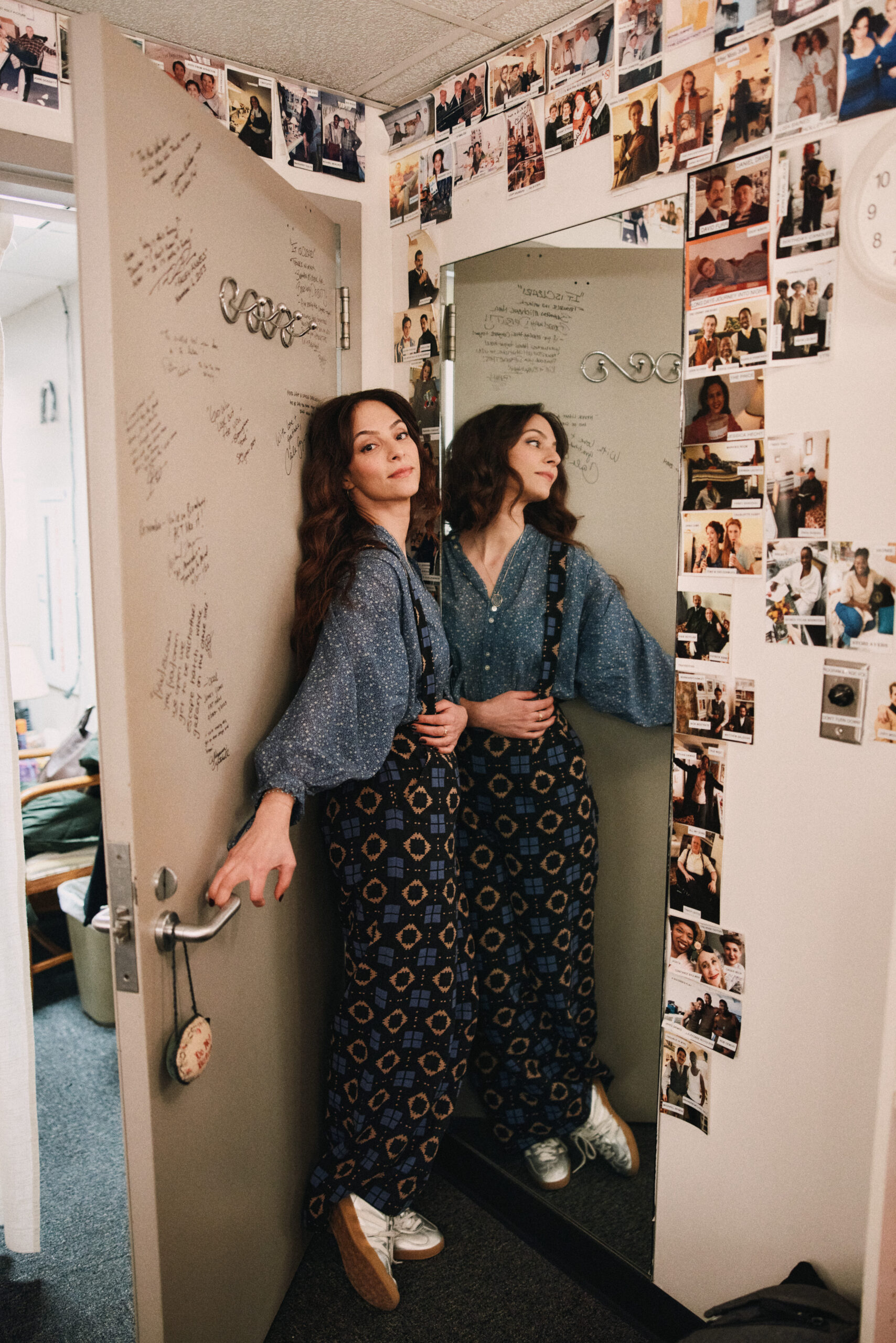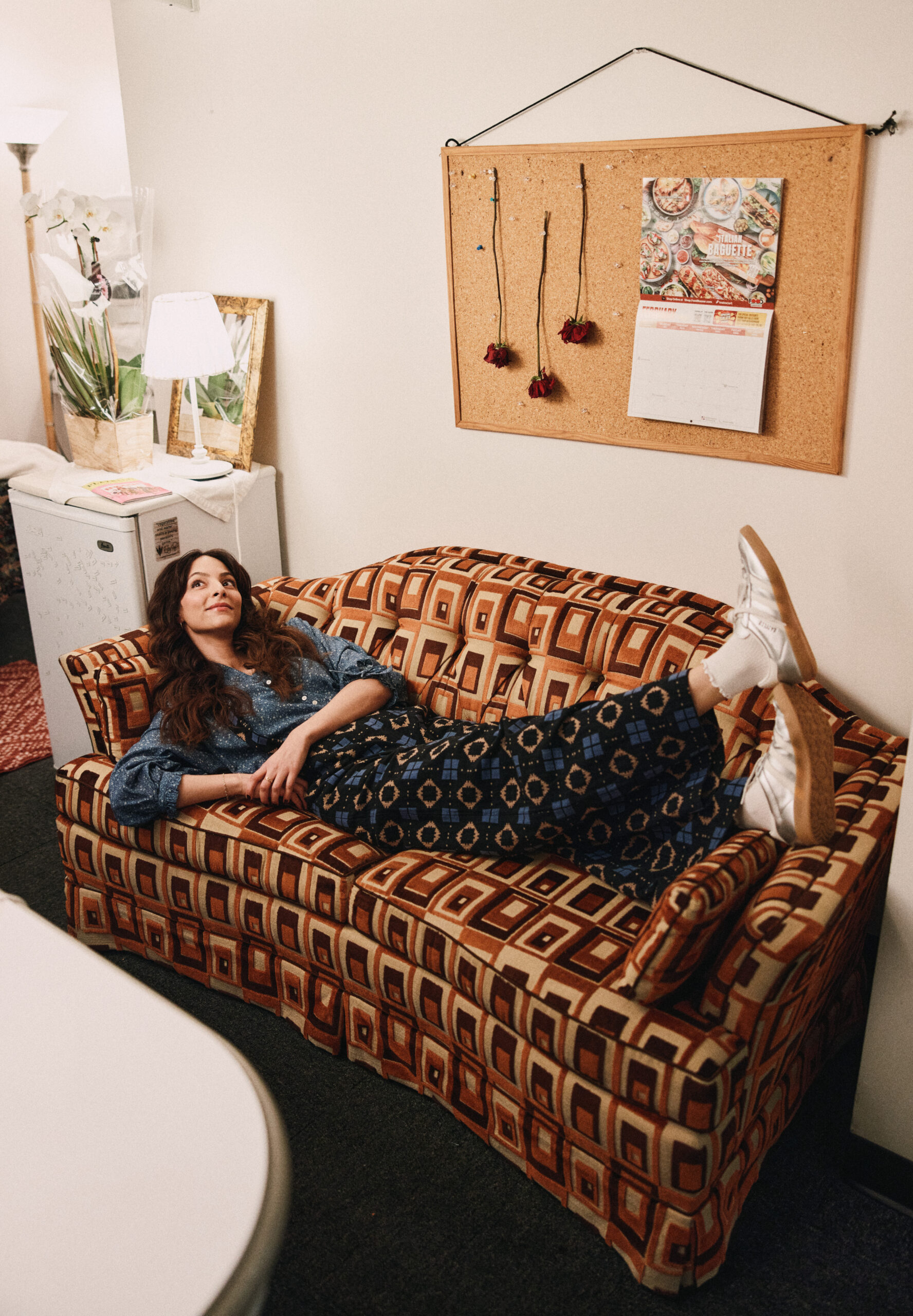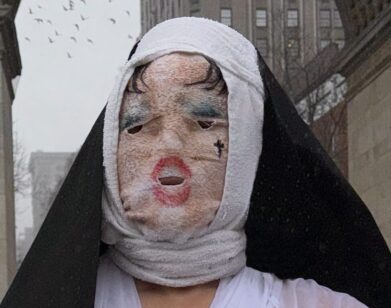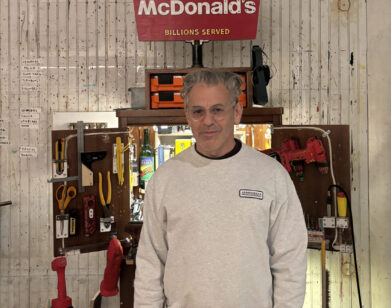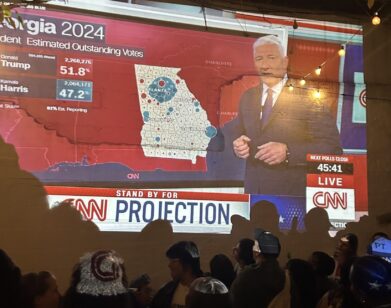BACKSTAGE
“The Laughter Is a Trojan Horse”: Behind the Scenes of English With Tala Ashe
The dilemma of Elham, Tala Ashe’s character in English, is that something she hates is blocking her from doing what she loves. That something is the English language, which she’s been struggling to learn for some time now. The Pulitzer-prize winning play by Sanaz Toossi follows a small class of adults in Karaj, Iran studying for their TOEFL (Test of English as a Foreign Language) exams over the course of several weeks, some with modest goals and others with a genuine affinity for the language. For Elham, though, mastering English is a matter of necessity. She dreams of studying in Australia, where she’s already been accepted with a teaching position if she can only get her test score together. Elham’s unfortunate combination of personality and skill would be lethal to any ego, especially one as robust as hers: she’s fiercely competitive and by far the worst at English in the class. Or, as the script has it, she “bulldozes through English.”
As much as Elham struggles to articulate herself in English, Ashe’s performance deftly reveals her character’s layers over the course of this play, which undercuts the inherent comedy of language acquisition with the tragedy of assimilation, of giving up parts of yourself in the often botched translation. Elham is spicy, competitive, prickly toward the more advanced students in the class and combative with her increasingly impatient teacher, who refuses to speak a word of Farsi with her. She is also so vulnerable and alive on the stage that we can feel her yearning and her frustration. Inevitably, we root for her.
For Ashe, time has recently felt like a circle. Toossi wrote the play in anger in 2017 after Donald Trump attempted to bar citizens of Muslim-majority countries from entering the U.S at the beginning of his first term. English debuted at the Atlantic Theater in 2022, just months before the death of Mahsa Amini at the hands of Iran’s Morality Police sparked a women-led liberation movement in the country of Ashe’s birth. Earlier this year, English opened on Broadway at the Todd Haimes Theatre in the weeks leading up to Trump’s second inauguration. I spoke to Ashe about what making her Broadway debut with this role means to her, how the play holds and challenges discomfort, and her pre-show routine.
———
JASMINE VOJDANI: This play, which is amazing, debuted off Broadway in 2022. How has it felt in general to return to this role and to this world after three years?
TALA ASHE: I mean, it’s a miracle. It has really felt like a waking dream to some degree. We had such a profound experience doing the play off Broadway. It felt like a very complete experience and we never thought that it would have a second or third chapter. More than anything, I’m just so happy that more people get to see a play that I think is really special and so beautiful.
VOJDANI: Completely. I’m curious how you originally came to the role and what the original casting process was like.
ASHE: So, I was working on a television show in Vancouver and I had three-month hiatuses between seasons so I wasn’t really available to do theater for five years, which was kind of killing me. But I did a reading of the play in 2019. I read it one afternoon in a basement and I just thought, “Wow, this is a really good play.” But I went to Vancouver to continue shooting. The show was slated to happen in 2020. Of course, it got pushed, which actually made it so that I was available to do the show. The exact dates happened to slot into where I could fit that in my hiatus with another play that I was already slated to do.
The other day, I found an email that I had sent to my manager that said, “I’m very, very tired.” I was coming off a crazy season of television. I said, “I think I’m going to kick myself if I don’t do this,” and I’m so glad I did.
VOJDANI: Sanaz Toossi has said that she wrote the play in rage after Trump kicked off his first term with the travel ban.
ASHE: Seems quaint now in comparison, I suppose.
VOJDANI: I mean, yeah. So here we are again in the second term. Why do you think it’s important for people to see this play now, in this new world that feels uncannily similar but, like you said, even darker?
ASHE: I mean, I’m an artist because I believe in the power of art. I believe art can express things in such a package that nothing else can. It elicits not just empathy and understanding, which is obviously important and the goal to a certain degree, but it accesses parts of you that are almost wordless. It’s funny, this is a play about language, but so often people come up to us and they’re like, “I just felt things.” Either about themselves or their family members or thinking about the bodega owner that they ran into in the morning who had an accent. This play contains all of that.
English is the most predominantly spoken language in the world. It is lingua franca. It is the language that gives access to education or work, it is that barrier to entry. What this play asks of us as actors and the audience is to think a little bit more deeply about what it actually takes to learn a second or third language and what parts of you get left behind. I think it just restores humanity to that picture. God knows we need more of that right now.
VOJDANI: The play takes place in two types of English. First you have very fluent English, which is meant to stand in for Farsi. It gives the audience access to the characters in a different way, usually more complex, and it’s a place where they feel more comfortable. And then you have the accented English of the classroom, the global language that they’re there to learn. What is your relationship to each of these languages?
ASHE: For me it’s sort of reversed. I was born in Iran and the first three years of my life I was speaking mostly Persian. It’s sort of chilling to watch old videos of myself at three and four and see how verbose I am, how articulate I am as, literally, a baby. And then I went to school in Ohio, where I grew up, and very much fell prey to wanting to fit in and assimilate. I didn’t lose the language because my parents have always spoken Farsi—Persian—to me, but my facility with the language is not great. When I speak Persian, I actually have the inverse experience of my character Elham when she tries to speak English, which is that I don’t feel like myself. I don’t feel smart, I don’t feel articulate. I don’t recognize myself in a way. So I very much understand her struggle.
VOJDANI: Let’s talk about your character. She’s unique in the classroom of the play because she is such a hater of the English language that they’re all there to learn. She’s a direct foil to Marjan, the teacher, who is convinced of the gospel of English as a portal into other worlds. And yet she’s come back to live in Iran after having been in Manchester for nine years. Elham is pugnacious, competitive, and sometimes harsh in English. But she’s also like, “Guys, you don’t understand. In Persian, I’m smart and I’m nice.” How did you think about showing the different facets of Elham, whether in the accented English or the fluent English?
ASHE: So much of this is in Sanaz’s brilliant writing. I obviously am drawn to Elham and her multidimensionality, and I wasn’t necessarily trying to craft who Elham is in English versus Persian. She states that she feels like an idiot when she speaks English, so there were sort of these goalposts along the way. I knew that she was not good at this language. It also says in the play that she speaks English like a bulldozer.
VOJDANI: I love that.
ASHE: Those descriptives were really helpful to me. As an actor, you encounter characters and there’s this interesting alchemy that happens. I really do think that characters meet you when they’re supposed to and have something to teach you. I think what Elham has to teach me is an unapologetic ambition and drive. Even though she asks different characters in the play if they like her, that’s not her primary objective in this world, being liked. It’s so refreshing to play a character that is not looking for that stereotypical, often female validation and need to be liked and need to be pretty and need to be tied up in a neat package with a beautiful bow. That’s felt really, really liberating honestly, to be on stage and be able to say, from my gut, “I fucking win!” and feel that in my bowels. It’s really nice in a profession that often asks you to be pretty and palatable for people. And at the same time, I think she is all those things. I think she’s a beautiful human being. She says, “I’m nice and I care about the world,” which she does.
Often to her mental health detriment, I think she sees the situation really, really clearly. Goli is just like, “I like English.” And she’s like, “But why do you like English,” and Goli’s like, “I like how I sound in it.” Elham is contemplating colonialism. She is thinking on a deeper level. She sees English as this necessary evil to get what she wants, but she doesn’t have love for it. She has love for Persian, she has love for Iran, she has love for her country and her family and her friends. She really resents—and I think she has a lot of anger, which is actually masking sadness—that she has to leave in order to pursue what it is that she wants.
VOJDANI: I really appreciated having her stand in for someone who’s not necessarily convinced that they want to leave, or maybe not forever, but who feels like they have to learn English in order to, in her case, study the thing that she wants to study.
ASHE: Yeah, and if you’re familiar with Iranian history in the last 40-plus years, it’s very understandable. Sometimes people say to me, “Why is she so angry?” And I’m like, “If you look at what it is to be a woman in that society, how are you not angry?” If you’re not angry, you’re not paying attention.
VOJDANI: Totally. I think the play sort of deals with discomfort in really interesting ways, depending on who the audience is. When I saw it with a mostly white—or at least non-Iranian audience—there were moments where people were just straight up laughing at these characters for how they sound. And that’s like, “Whoa, that’s really uncomfortable.” But I think the play is already aware of that and reverses that in a really interesting way by the end. But I just really loved that about it, the discomfort.
TALA: That’s so astute and one of the things I like most about the play, often because I am the butt of that particular joke. The laughter is sort of a Trojan horse asking us to examine our point of view on people who are speaking another language or speaking accented English.
VOJDANI: I think the Borat line for this reason sort of lands as not a joke. It’s a knife in the play. It holds all these resonances that are really complicated. It’s one Middle Easterner using this Western representation of themselves against another. We all know that reference. I couldn’t help thinking of my dad who like, does Borat voice for his white colleagues’ entertainment. It’s really complicated and fascinating.
ASHE: Right!
VOJDANI: But I’m curious, were there any scenes that you found super challenging or that you were nervous about?
ASHE: I wouldn’t say nervous, but the final scene of the play is a bit of a tightrope act. Not to give anything away, Elham is re-entering the classroom with a secret and also a need and balancing those two things. There is sort of cat and mouse-ness to that final scene as she is prodding her teacher. At the same time, she is realizing, “Okay, I got what it is that I wanted.” I think a lot of us experience this: you get that thing that you wanted and it feels completely different than you realize. In her case, it means that she has to say goodbye to her country. It’s an enormous thing to hold. I knew how important that scene was and that it culminated in us hearing the Persian language for 30 seconds and for the audience to, for the first time, have the experience that the characters have been having the entire time, that sense of alienation. It’s such an important and artful scene. So it’s important to me to go on that ride every night truthfully because I think it requires a kind of delicate balancing act.
VOJDANI: Yeah, and what’s so powerful about this ending is that not everyone gets to completely understand it. I also couldn’t help but think about the political context of putting this play on now as opposed to in early 2022, including everything that has happened in Iran with the Women Life Freedom movement following the death of Mahsa Amini. Has anything hit you differently in the three-years-later of it all?
ASHE: Absolutely. This play takes place in 2007, 2008, the eve of the Green Revolution. They’re sort of like the precursor to what has happened in the last three years with the Woman Life Freedom movement. But obviously that’s more fresh in our minds, and many of my castmates are very actively invested and involved in following it and heralding the bravery of the women of Iran. I talked to Marjan [Neshat], who plays Marjan in the play, about that in relation to the final scene of the play. It’s sort of undeniable: we’re two Iranian women in the diaspora standing on a Broadway stage together and we’ve lived through the past three years. It’s not that the play didn’t feel important and heavy three years ago—it absolutely did—but it feels like it costs me a lot more every night. I walk off-stage sort of devastated now. That’s not my memory of doing it three years ago and I think that has to do with what’s happened in the world, specifically in Iran, but the larger picture as well. I, like Elham, care about the world, and I’m very attuned to what’s happening in the world, so of course that infuses who I am.
Even though we’re elated to be on Broadway and it’s a very funny, delightful show, personally it has been a much heavier experience. There’s a deeper sense of responsibility now, knowing what women in Iran have done and gone through in the last three years especially. It seems trite to call it brave. But as people in America who are depicting Iranian characters, I feel like a very humble approach to that and a great deal of responsibility. It doesn’t necessarily make historical sense, but in the final moments of the play, Marjan touches Elham’s hair, and that’s a nod to the last three years. That’s not necessarily consistent with 2007—that’s consistent with now.
VOJDANI: Also at the end, your character draws herself on the whiteboard and I noticed her hair is really in the wind.
ASHE: Yes, yes! Actually, if you were able to pull up the old image, the hair is much tighter inside. It’s more about the green veil, which obviously represented the Green Revolution. But yeah, honestly, that hair gets bigger and bigger every night.
VOJDANI:The hair is out!
ASHE: Yeah, the hair is out.
VOJDANI: Maybe one night it’ll just be hair.
ASHE: Maybe.
VOJDANI: On a lighter note, how are you spending your days before the show? This is your first time on Broadway! That’s so exciting, and the whole cast has come back. How does that feel?
ASHE: This is my Broadway debut and I couldn’t ask to be doing it with a show that I love or am more proud of. Honestly, it’s a lot of self-care. A Broadway schedule is pretty brutal, especially during the winter where the flu is raging in New York. There’s a million diseases around. A lot of it is making sure that I’m up to the task of doing the show. It’s actually really vocally challenging for me. Speaking in the two accents uses very technical and different parts of my voice. And I’m screaming and doing some hijinks in the play. So a lot of it is self-care. And because it’s a Broadway show and we want everyone to see it, we’ve also had opportunities to publicize the show, so that has taken up some of the time. It’s really full-on. I try to read and sleep and cuddle with my cats and recharge when I can, but mostly I’m taking it one day at a time and trying not to miss the texture of this experience.
VOJDANI: Have you read anything good lately?
ASHE: I’m currently reading Orlando. I’m a big reader, but it’s been a little bit hard for some reason while doing this play. But that’s what I’m currently making my way through.
VOJDANI: Amazing. Wait, did you work with a dialect coach on the different Englishes, or were you just drawing from family?
ASHE: No, I had a lot of inspiration in my life [laughs], plenty of people to draw from. The director [Knud Adams] and playwright made a very conscious effort in terms of the accents. It was less about doing the accent perfectly and more about delineating which character has more fluency versus another. Sanaz has an excellent ear and was always available to tell me, “Okay, I need more accent on this” or actually less for clarity sake. Here’s an example: at some point I say that people like English accents and French accents. If I was going to say that in a Persian accent, I would say, “Freh-rench,” and Feh-rench doesn’t sound like French.
VOJDANI: It gets lost.
ASHE: So in that instance, I say French, even though Elham would probably say, “Feh-rench.” I very much trusted Sanaz’s ear and outside eye in pursuit of clarity and what makes sense theatrically.
VOJDANI: What is your pre-show routine once you’re locking in?
ASHE: This steamer here is my friend for the winter months. I try to get to the theater an hour and a half before the show. I meditate and I do a vocal warmup. Then every day we do a “ball call,” which is the Koosh word game that we play in the show — we all live in fear of ruining that. If that goes off the rails, God forbid. Then I turn on some Persian pop music, I’ve got my Googoosh going, I’ve got my Hayedeh going. I have photos of my family and some other images of women, primarily from the Green Movement. I just sort of take a moment with those and stick my pencil in my ear and go on stage.

